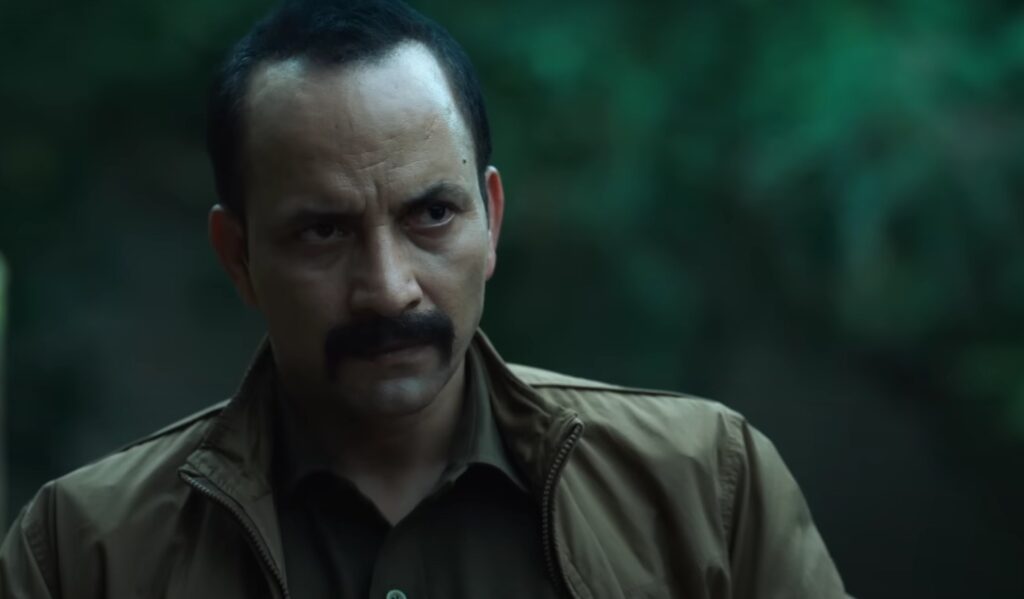Sector 36 is such a close thing to brilliance, yet its writing cannot make it the case. The movie has all going for it: a great source material, competent direction, revealing a good sense of blocking and visual storytelling, and two outstanding performances by Vikrant Massey and Deepak Dobriyal. Despite these strengths, the screenplay never really capitalizes on the material at its disposal, leaving the film feeling underwhelming where it could have been exceptional.

Loosely based on the infamous Nithari case, Sector 36 really plunges into dark territory with gruesome themes and human depravity. The potential of the story is much stronger, and with that kind of foundation, one could have really crafted that into a really gripping thriller. Still, the screenplay cannot take one angle or aspect seriously, whether it is a character study of Massey’s unsettling role, a hard-hitting police procedural, or a poignant commentary on class division, leaving the narrative feeling scattered. The film hovers over these interesting possibilities but never commits to them fully, ultimately handicapping its impact.
Vikrant Massey is a revelation. It is difficult to come by an actor who is so nuanced and intense on the screen, and Massey does it almost chillingly easily. He seems to channel dark magnetism and underlying menace in his character that one would associate with the Joker; even this comparison sounds trite, but it’s a fair reflection of his screen presence.

Massey is extremely unnerving, and you feel the fear of his character every time he appears. The screenplay unfortunately doesn’t give him much to do about it. Except for an interrogation scene that is highly disturbing and creates an aura of palpable dread, he has too little to work with. His talent is wasted, and the result is a missed opportunity to create a character as memorable as the great anti-heroes of cinema.
The film could have shone brighter had it focused on Massey’s character, crafting a psychological deep-dive in the style of a Scorsese character study. It might have served to open layers of the disturbed psyche of his character, some visceral insight into what was driving him, setting the stage for him to almost become a Shakespearean presence in this dark landscape. Instead, the screenplay elects to flirt with those other genres, touching onto police procedural elements while feebly attempting a more toothless commentary on class divisions. This half-hearted approach drains away from the character-driven storyline that could have made Massey’s part unforgettable.
Or Sector 36 could have been an exciting film if it had played to the police procedural genre fully, taking its cue from Zodiac. Had the movie been structured like a high-stakes investigation slowly unraveling the mystery with suspenseful revelations, it could have kept the audience’s attention in a manner that the current plot cannot. In such a scenario, the character of Massey might have ended up being the specter in the wings throughout his identity and his purpose ultimately only revealed over an explosive confrontation. It might have kept the audience guessing and operated along a steadily rising tension, a hallmark of some of the best thrillers in the category.

What the movie really gives the viewer is the middle ground that does not quite do justice to either idea. It feels a little directionless because of its intent to touch all these different genres without ever actually setting down deep roots in one place, but then, perhaps because of the aimless feeling, it would also never be one of those tightly focused scripts that forever becomes etched in mind. Not to say this is a bad film altogether; it somehow does create an uncomfortable atmosphere that neither makes it explicit nor offensive and rather speaks volumes silently. There is an art to such restraint, and in this regard, the film can be credited.
The other theme that is touched on is class division, although not fully developed. How power and privilege distort justice is a concept that one can easily relate to even in real cases, even the Nithari case itself. However, such a thread is left largely unexplored. Sector 36 could have been something more if the film explored these societal divisions in deeper details so that it had intellectual and emotional weight to take the movie beyond the surface thriller.
Sector 36 basically makes one shiver at what lies in the shadows of society. Although it did not depict disturbing acts, its overall atmosphere is haunting, leading one to think and be introspective. There are moments when you feel really uncomfortable, not because of what is shown but because of what is implied. This element of subtlety is where the film finds its voice, and it’s a voice that could have been amplified with a more consistent screenplay.

One cannot overlook the supporting role played by Deepak Dobriyal, an actor known for his versatility and ability to disappear into roles. It grounds the film when it seems to be getting too close to its more chaotic undertones, bringing a balance it needs. With Massey, although underused, there is chemistry; it brings gravity to the story. With Dobriyal also comes missed opportunities in the screenplay: the dynamics in his relationship with Massey could have played much more to their advantage had the whole drama revolved around his love life.
Sector 36 promises to take off. The sense of blocking and visual storytelling that flows through this film makes for a dark claustrophobic atmosphere very suitable for its grim subject matter. The director seems to know how to play the frame to play upon tension, and the cinematography is of a type with grittiness needed by this genre. Tied up with tighter writing could have made the direction nothing short of exceptional; of course, there’s still talent behind the camera lens. Too bad, for this visual strength cannot go along with the depth it should have in narration on the script.
So unfortunately, it is a film with great potential unrealized. Here is a thriller that easily could have been a profundity of character study and a tightly wound procedural at the same time but simply does not find its grip in the middle. Performed by Vikrant Massey and Deepak Dobriyal, who add stability to the movie despite its weak screenplay, lack of confidence in the direction. Massey, for instance, is a chameleon, bringing an intensity to the role that deserves a more focused narrative.
In short, while Sector 36 does disturb and provoke thought, it never quite reaches the heights it could have. The film leaves you with a lingering sense of what could have been—a cinematic experience that scratches the surface of greatness but never quite breaks through. For the viewer, though, the film is well worth a watch, just for Massey’s chilling performance, but, sadly, one can’t help but feel he deserved far, far better than this screenplay.

Chaitanya Tuteja is someone who enjoys sharing his thoughts on books, movies, and shows. Based in India, he appreciates exploring different stories and offering honest reflections. When not reflecting on his favorite media, Chaitanya enjoys discovering new ideas and embracing life’s simple moments.


On this platform, you can access a great variety of online slots from leading developers.
Players can experience traditional machines as well as modern video slots with vivid animation and exciting features.
If you’re just starting out or a casino enthusiast, there’s something for everyone.
casino
All slot machines are ready to play anytime and designed for PCs and tablets alike.
All games run in your browser, so you can start playing instantly.
Site navigation is user-friendly, making it quick to browse the collection.
Register now, and enjoy the thrill of casino games!